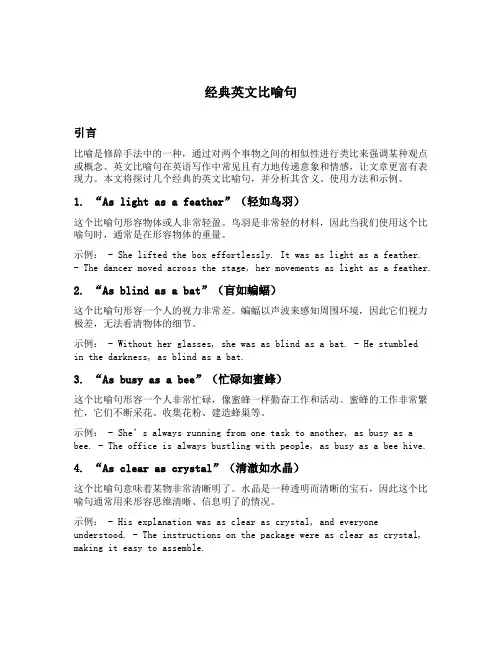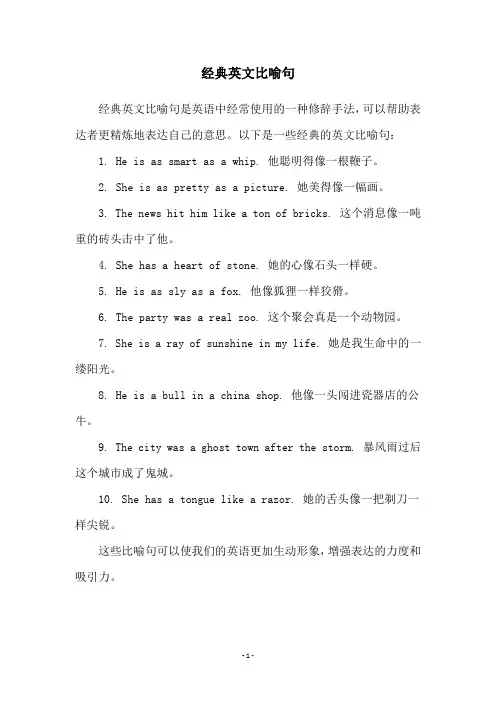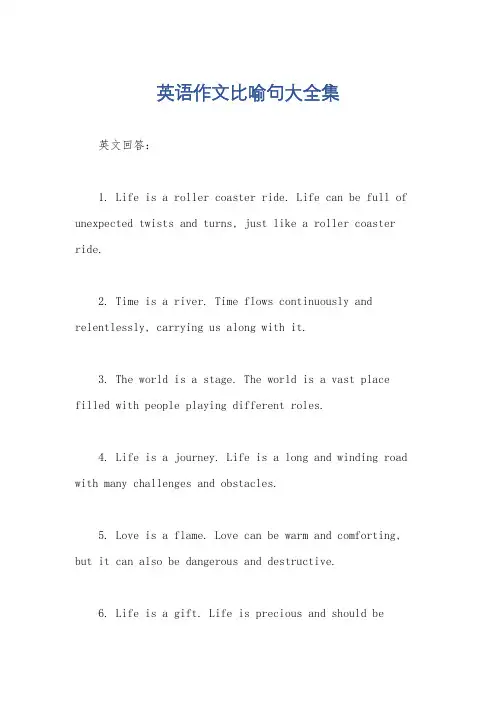英语中的比喻句型
- 格式:doc
- 大小:43.00 KB
- 文档页数:9

英语中的比喻修辞手法
英语中的比喻修辞手法主要包括明喻、隐喻和借喻三种。
1. 明喻(Simile):是将两种具有共同特征的不同事物或现象进行对比,表明本体和喻体之间的相似关系,常用的比喻词有like、as 等。
例如:
- She runs like a cheetah. 她跑得像一只猎豹。
- His heart is as cold as ice. 他的心像冰一样冷。
2. 隐喻(Metaphor):是一种比较含蓄的比喻,它不使用比喻词,而是直接将本体说成喻体。
例如:
- Life is a journey. 生活是一次旅行。
- The world is a stage. 世界是一个舞台。
3. 借喻(Metonymy):是一种以小见大的比喻,它不直接把所要说的事物名称说出来,而是用跟它有关系的另一种事物的名称来称呼它。
例如:
- The pen is mightier than the sword. 笔杆子比刀剑更有力。
- He is the Newton of our time. 他是我们这个时代的牛顿。
这些比喻修辞手法可以使语言更加生动形象,增强表达力和感染力。

高中二年级英语比喻句、拟人句汇总和练
习
比喻句(Similes)是一种修辞手法,通过将两个不同事物进行比较,强调它们之间的共同特点。
下面是一些常用的高中二年级英语比喻句的例子:是一种修辞手法,通过将两个不同事物进行比较,强调它们之间的共同特点。
下面是一些常用的高中二年级英语比喻句的例子:
1. 她的笑容明亮如太阳。
2. 这个城市的夜晚就像一片黑色的海洋。
3. 他的声音像细雨一样轻柔。
4. 研究知识就像探索未知的旅程。
5. 那个男孩的目光锐利如猎豹。
6. 她的眼睛像深邃的湖水一样清澈。
7. 他的皮肤白皙如雪。
8. 我的心情像一朵盛开的花朵般快乐。
拟人句(Personification)是一种修辞手法,赋予非人类事物以人的特性和行为。
以下是一些高中二年级英语拟人句的例子:
是一种修辞手法,赋予非人类事物以人的特性和行为。
以下是一些
高中二年级英语拟人句的例子:
1. 那棵老树在风中低声诉说着它的故事。
2. 黑夜吞噬了整个城市。
3. 太阳躲在云朵后面害羞地笑。
4. 这片草原向我微笑着迎接。
5. 雨点们跳舞着落在大地上。
6. 书本们静静地等待着被翻阅。
7. 音乐在我的耳边轻轻呢喃,让我心旷神怡。
希望以上提供的比喻句和拟人句的例子能帮助你理解和练习。
通过运用这些修辞手法,可以使你的写作更加生动有趣。
不仅如此,也能够提升你的语言表达能力。
加油!。

高中英语作文生动夸张的比喻句子1、比喻(metaphor)比喻就是打比方。
可分为明喻和暗喻:明喻(simile):用like,as,as...as,as if(though)或用其他词语指出两个不同事物的相似之处。
例如:o my love's like a red,red rose.我的爱人像一朵红红的玫瑰花。
the man can't be trusted.he is as slippery as an eel.那个人不可信赖。
他像鳗鱼一样狡猾。
he jumped as if he had been stung.他像被蜇了似的跳了起来。
childhood is like a swiftly passing dream.童年就像一场疾逝的梦。
暗喻(metaphor):用一个词来指代与该词所指事物有相似特点的另外一个事物。
例如:he has a heart of stone.他有一颗铁石心肠。
the world is a stage.世界是一个大舞台。
2、换喻(metonymy)用某一事物的名称代替另外一个与它关系密切的事物的名称,只要一提到其中一种事物,就会使人联想到另一种。
比如用the white house代替美国政府或者总统,用the bottle来代替wine或者alcohol,用the bar来代替the legal profession,用crown代替king等。
例如:his purse would not allow him that luxury.他的经济条件不允许他享受那种奢华。
the mother did her best to take care of the cradle.母亲尽最大努力照看孩子。
he succeeded to the crown in 1848.他在1848年继承了王位。
3、提喻(synecdoche)指用部分代表整体或者用整体代表部分,以特殊代表一般或者用一般代表特殊。

高考题中英语中的比喻修辞手法比喻是一种修辞手法,用于通过将一个事物与另一个事物进行比较,以便更生动地描述或解释一个概念。
在高考英语中,比喻修辞手法经常被使用。
以下是一些常见的比喻修辞手法的例子:
1. "He is a shining star."(他是一颗闪耀的星星。
)比喻了某个人具有耀眼的光芒或出众的才华。
2. "Her smile is a ray of sunshine."(她的微笑如阳光一般。
)比喻了某人的微笑给人带来的快乐和温暖。
3. "Time is money."(时间就是金钱。
)比喻了时间的宝贵和重要性。
4. "The classroom was a zoo."(教室像个动物园。
)比喻了教室的混乱和喧嚣。
5. "His words were bullets, piercing through her heart."(他的话如子弹一般,射穿她的心。
)比喻了某人的话语对她造成的伤害。
通过使用比喻修辞手法,作者可以利用生动的形象和比较来增强
文本的表达力和吸引力,使读者更容易理解和记忆文本中的内容。
因此,了解和运用比喻修辞手法对于高考英语的阅读和写作都非常重要。

英语比喻句英语比喻句大全比喻这种修辞格在英语中的应用常见而广泛。
它能使语言更加形象生动、鲜明突出。
并非所有的英语比喻都能直译为相应的汉语。
如果说一概望文生义,就难免出错。
下面就介绍一些有趣的英语比喻。
英语比喻句:1).As sound as a bell 十分健康(不宜译为“像钟一样完美”)2).As cunning as a dead pig 像狐狸一样狡猾(不宜译为“像死猪一样狡猾”)3).As timid as a rabbit 胆小如鼠(不宜译为“胆小如兔”)4).As close as an oyster 守口如瓶(不宜译为“像牡蛎一样的紧密”)5).As close as a clam 一毛不拔(不宜译为“像蛤蚌一样紧密”)6).T o drink like a fish 牛饮(不宜译为“像鱼饮水”)7).like a duck to water 如鱼得水(不宜译为“如鸭得水”)8).As scarce as hen’s te eth 少如凤毛麟角(不宜译为“少如母鸡牙齿”)9).like a rat in a hole 瓮中之鳖(不宜译为“洞中之鼠”)10).T o set the cat among the pigeons 引狼入室(不宜译为“把猫放入鸽群”)11).T o lead a dog’s life 过牛马不如的生活(不宜译为“过狗的生活”)12).like a drowned rat 好像落汤鸡(不宜译为“像落水老鼠”)13).T o eat like a horse 狼吞虎咽(不宜译为“像马吃东西”)14).Like a cat on hot bricks 热锅上的蚂蚁(不宜译为“热砖上的猫”)15).Industrious as an ant 像蜜蜂一样勤劳(不宜译为“像蚂蚁一样勤劳”)16).Thirsty as a camel 像一条渴龙(不宜译为“渴得像骆驼”)汉语和英语中都有大量的比喻,然而,理解另一种语言的比喻往往并不容易。

英文比喻句的四种模式
英文比喻句的四种模式分别是明喻,暗喻,提喻以及借喻。
明喻(Simile):明喻是将具有共性的不同事物作对比。
这种共性存在于人们的心里,而不是事物的自然属性。
标志词常用like, as, seem, as if, as though, similar to, such as等。
通过明喻,作者能够通过读者熟悉的对象更加生动形象地了解不熟悉的对象,从而表达出作者的特定情感或者态度(mood or attitude)。
暗喻(Metaphor):暗喻与明喻非常类似,也是讲具有某个共同特征的两个不同事物联系在一起,但是不用as,as…as,as if,like,seem等的比喻词。
与明喻相似,隐喻能把描述的对象更形象的呈现给读者。
因为不使用比喻词,所以通常我们会更加关注与隐喻背后的引申义,而不是仅仅是它的字面义。
借喻(Metonymy):以喻体来代替本体,本体和喻词都不出现,直接把甲(本体)说成乙(喻体)。
借喻由于只有喻体出现,所以能产生更加深厚、含蓄的表达效果,同时也使语言更加简洁。
提喻(Synecdoche):提喻用部分代替全体,或用全体代替部分,或特殊代替一般。

经典英文比喻句引言比喻是修辞手法中的一种,通过对两个事物之间的相似性进行类比来强调某种观点或概念。
英文比喻句在英语写作中常见且有力地传递意象和情感,让文章更富有表现力。
本文将探讨几个经典的英文比喻句,并分析其含义、使用方法和示例。
1. “As light as a feather”(轻如鸟羽)这个比喻句形容物体或人非常轻盈。
鸟羽是非常轻的材料,因此当我们使用这个比喻句时,通常是在形容物体的重量。
示例: - She lifted the box effortlessly. It was as light as a feather. - The dancer moved across the stage, her movements as light as a feather.2. “As blind as a bat”(盲如蝙蝠)这个比喻句形容一个人的视力非常差。
蝙蝠以声波来感知周围环境,因此它们视力极差,无法看清物体的细节。
示例: - Without her glasses, she was as blind as a bat. - He stumbled in the darkness, as blind as a bat.3. “As busy as a bee”(忙碌如蜜蜂)这个比喻句形容一个人非常忙碌,像蜜蜂一样勤奋工作和活动。
蜜蜂的工作非常繁忙,它们不断采花、收集花粉、建造蜂巢等。
示例: - She’s always running from one task to another, as busy as a bee. - The office is always bustling with people, as busy as a bee hive.4. “As clear as crystal”(清澈如水晶)这个比喻句意味着某物非常清晰明了。
水晶是一种透明而清晰的宝石,因此这个比喻句通常用来形容思维清晰、信息明了的情况。

英语中的比喻句1、人们总是把老师比喻为燃烧的蜡烛。
Teachers are often pared to burning candles.2、他喜欢在说话中用比喻。
He likes to talk in similitude.3、在诗歌中,人生被比喻为朝露。
Life is poetically pared to the morning dew.4、他是含着银汤匙出生的孩子,比喻出生豪门。
He was born with a silver spoon in his mouth.5、强壮的人通常被比喻为狮子。
A strong man is often pared to a lion.6、鸡饲料?我怀疑只是个比喻。
He pays his labourers chicken feed.7、他想用垒球作个比喻。
He wanted to use the baseball as a metaphor.8、他思想上的这种爱好比喻的习惯,削弱了他的判断能力。
This figurative habit of his mind crippled his judgement.9、他把这种转变比喻成从健康的沙拉到油腻的汉堡。
He likened the shift to that from a healthy salad to a greasy hamburger.10、他滑得象个狐狸。
他很狡猾。
对他你可要当心点儿。
He’s as sly as a fox. He’s foxy. You’ve got to watch him.11、你这头驴!你这头蠢驴!怎么会干出那种事儿来?!You ass! You stupid ass! How could you do a thing like that?!12、他没有自己的观点,只会鹦鹉学舌.He doesn’t have an idea of his own. He just parrots what other people say.13、孩子们准备过节忙得象蜜蜂一样。

经典英文比喻句
经典英文比喻句是英语中经常使用的一种修辞手法,可以帮助表达者更精炼地表达自己的意思。
以下是一些经典的英文比喻句:
1. He is as smart as a whip. 他聪明得像一根鞭子。
2. She is as pretty as a picture. 她美得像一幅画。
3. The news hit him like a ton of bricks. 这个消息像一吨重的砖头击中了他。
4. She has a heart of stone. 她的心像石头一样硬。
5. He is as sly as a fox. 他像狐狸一样狡猾。
6. The party was a real zoo. 这个聚会真是一个动物园。
7. She is a ray of sunshine in my life. 她是我生命中的一缕阳光。
8. He is a bull in a china shop. 他像一头闯进瓷器店的公牛。
9. The city was a ghost town after the storm. 暴风雨过后这个城市成了鬼城。
10. She has a tongue like a razor. 她的舌头像一把剃刀一样尖锐。
这些比喻句可以使我们的英语更加生动形象,增强表达的力度和吸引力。
- 1 -。

英语作文比喻句大全集英文回答:1. Life is a roller coaster ride. Life can be full of unexpected twists and turns, just like a roller coaster ride.2. Time is a river. Time flows continuously and relentlessly, carrying us along with it.3. The world is a stage. The world is a vast place filled with people playing different roles.4. Life is a journey. Life is a long and winding road with many challenges and obstacles.5. Love is a flame. Love can be warm and comforting, but it can also be dangerous and destructive.6. Life is a gift. Life is precious and should becherished.7. The mind is a garden. The mind can be a fertile place for growth and creativity.8. The heart is a compass. The heart can guide us through the challenges of life.9. The soul is a mirror. The soul reflects our true selves.10. The body is a temple. The body is sacred and should be treated with respect.中文回答:1. 人生是一场过山车之旅。

英语比喻句1. Her eyes are like stars, twinkling in the night sky.(她的眼睛像星星,在夜空中闪烁。
)2. The road is a ribbon of moonlight.(这条路像一条月光铺成的丝带。
)3. His smile is as warm as the sun.(他的微笑像太阳一样温暖。
)4. The snowflakes are like feathers, falling gently.(雪花像羽毛一样轻轻飘落。
)5. The tree is a giant umbrella, providing shade.(这棵树像一把巨大的伞,提供阴凉。
)6. Her hair is like a golden waterfall.(她的头发像金色的瀑布。
)7. The river is a silver snake, winding through the land.(这条河像一条银色的蛇,蜿蜒穿过大地。
)8. The clouds are like cotton balls in the sky.(云朵像天空中的棉花球。
)9. His voice is as smooth as velvet.(他的声音像天鹅绒一样柔和。
)10. The moon is a big silver plate in the sky.(月亮像天空中一个巨大的银盘。
)11. The flower is a beautiful dancer, swaying in the breeze.(这朵花像一位美丽的舞者,在微风中摇曳。
)12. The city at night is a sea of lights.(夜晚的城市是一片灯海。
)13. Her skin is like porcelain, smooth and fair.(她的皮肤像瓷器,光滑白皙。
比喻明喻的英语句子1. 给我一些英语中的明喻或者暗喻的句子英语修辞手法一,明喻(simile)是以两种具有相同特征的事物和现象进行对比,表明本体和喻体之间的相似关系,两者都在对比中出现。
常用比喻词like, as, as if, as though等,例如:1、This elephant is like a snake as anybody can see.这头象和任何人见到的壹样像壹条蛇。
2、He looked as if he had just stepped out of my book of fairytales and had passed me like a spirit.他看上去好像刚从我的童话故事书中走出来,像幽灵壹样从我身旁走过去。
3、It has long leaves that sway in the wind like slim fingers reaching to touch something.它那长长的叶子在风中摆动,好像伸出纤细的手指去触摸什麽东西似的。
二、隐喻(metaphor)这种比喻不通过比喻词进行,而是直接将用事物当作乙事物来描写,甲乙两事物之间的联系和相似之处是暗含的。
1、German guns and German planes rained down bombs, shells and bullets。
德国人的枪炮和飞机将炸弹、炮弹和子弹像暴雨壹样倾泻下来。
2、The diamond department was the heart and center of the store.钻石部是商店的心脏和核心。
2. 给我一些英语中的明喻或者暗喻的句子英语修辞手法一,明喻(simile)是以两种具有相同特征的事物和现象进行对比,表明本体和喻体之间的相似关系,两者都在对比中出现。
常用比喻词like, as, as if, as though等,例如:1、This elephant is like a snake as anybody can see. 这头象和任何人见到的壹样像壹条蛇。
英语作文比喻句大全集1. Can you give me some examples of metaphors in English?Sure, here are some examples of metaphors in English:- Life is a journey.- Love is a rose.- Time is money.- The world is a stage.- He is a shining star.可以,以下是一些英语中的比喻句:- 人生是一段旅程。
- 爱情是一朵玫瑰。
- 时间就是金钱。
- 世界是一个舞台。
- 他是一颗闪耀的星星。
2. What is the purpose of using metaphors in writing or speaking?The purpose of using metaphors in writing or speaking is to create a more vivid and memorable image in the reader or listener's mind. Metaphors can help convey complex or abstract ideas in a more accessible and relatable way by comparing them to something familiar or concrete. They can also add depth and richness to language, making it more expressive and engaging.使用比喻句的目的是为了在读者或听众的心中创建更生动和难忘的形象。
比喻句可以通过将复杂或抽象的概念与熟悉或具体的事物进行比较,以更易于理解和相关的方式来传达。
它们还可以增加语言的深度和丰富性,使其更具表现力和吸引力。
英语的比喻句子大全1. 比喻的英语句子1).As sound as a bell 十分健康(不宜译为“像钟一样完美”)2).As cunning as a dead pig 像狐狸一样狡猾(不宜译为“像死猪一样狡猾”) 3).As timid as a rabbit 胆小如鼠(不宜译为“胆小如兔”)4).As close as an oyster 守口如瓶(不宜译为“像牡蛎一样的紧密”)5).As close as a clam 一毛不拔(不宜译为“像蛤蚌一样紧密”)6).To drink like a fish 牛饮(不宜译为“像鱼饮水”) 7).like a duck to water 如鱼得水(不宜译为“如鸭得水”)。
2. 比喻的英语句子1).As sound as a bell 十分健康(不宜译为“像钟一样完美”)2).As cunning as a dead pig 像狐狸一样狡猾(不宜译为“像死猪一样狡猾”)3).As timid as a rabbit 胆小如鼠(不宜译为“胆小如兔”)4).As close as an oyster 守口如瓶(不宜译为“像牡蛎一样的紧密”)5).As close as a clam 一毛不拔(不宜译为“像蛤蚌一样紧密”)6).To drink like a fish 牛饮(不宜译为“像鱼饮水”)7).like a duck to water 如鱼得水(不宜译为“如鸭得水”)3. 描写月亮英语句子大全1、月亮,圆圆的,像纺车,纺着她浪漫的遐思。
the moon is round, like a spinning wheel, spinning her romantic reverie.2、月亮像饱经风霜的老人,不紧不慢地梳理着白花花的月光。
the moon is like the old combs have experienced years of wind and frost, neither fast nor slow a shining white moonlight.3、一轮圆月升起来了,像一盏明灯,高悬在天幕上。
高考题中英语中的比喻修辞手法
在英语高考题中,常常会涉及到比喻这种修辞手法,下面是一些常见的英语比喻修辞手法:
1. 直接比喻:直接将一个事物与另一个事物作比较并进行说明,如"The classroom was a zoo." (教室像一个动物园)。
2. 隐喻:即暗喻,不明说而通过暗示或隐晦的方式表达比喻意义,如 "After
a long day at work, he was a broken man." (工作一整天后,他像个倒霉蛋)。
3. 拟人:将非人类的事物或抽象的事物赋予人的特征,如"The wind whispered through the trees." (风低语着从树木间穿过)。
4. 反复比喻:在文章中多次重复使用同一种或类似的比喻,如"He was like a robot, going about his daily routine without any emotion." (他像个机器人一样,每天按照惯例重复行为,没有任何情感)。
5. 直接挑战:此类比喻修辞手法常用于修辞或讽刺,通过将具体事物直接挑战或同化形容另一事物,如 "The wine was an acid in his mouth." (这酒像是他嘴里的酸溶液)。
这些英语比喻修辞手法在阅读和写作中都非常常见,建议熟练掌握这些手法并在英语学习和写作中灵活运用。
英语中的比喻的运用
比喻是一种常见的语言修辞手法,在英语中得到广泛应用。
比喻是通过将一个事物与另一个事物进行比较来表达某种意义的方法。
常见的英语比喻包括:
1. 'Life is a journey.' (生命是一段旅程。
)
2. 'He has a heart of stone.' (他心如石头。
)
3. 'She is a ray of sunshine.' (她是一缕阳光。
)
4. 'Time is money.' (时间就是金钱。
)
比喻可以使语言更加生动、形象、有趣,也有助于加深读者或听众的理解和记忆。
然而,如果使用不当,比喻也可能引起误解或引起不必要的争议。
因此,在运用比喻时,需要注意以下几点:
1. 确保比喻的意义清晰、易于理解。
2. 不要过度使用比喻,以免产生疲劳或混淆。
3. 避免使用不当或不恰当的比喻,以免引起误解或冒犯。
总之,比喻是一种有力的语言表达方式,可以帮助人们更好地理解和表达思想。
在运用比喻时,需要注意掌握好度,以免产生不良后果。
- 1 -。
幽默的比喻英语句子大全1. 英语的比喻句有哪些1. The Children were as busy as bees,making Preparations for the festival.孩子们准备过节忙得像蜜蜂一样。
2. The Chinese people stood up like a giant.中国人民像巨人一样站起来了。
3. Use a book as a bee does a flower.像蜜蜂利用花一样,去利用书籍吧。
4. The childhood shows the man, as morning shows the day.一个人的童年,就好比一天的早晨5. The muscles of his brawny arms are as strong as iron bands.(Longfellow)他强壮手臂上的肌肉像铁铸的带条。
6. Parks are to the city as lungs are to the body.公园对于都市正如肺对于人的身体。
7. Our village is no less beautiful than this picture.我们的乡村同这幅画一样美丽。
8. his woman made him fetch and carry just as if he was a geat Newfoundland dog.这个女人就和纽芬兰的大狗一般。
9. His heart shivered as a ship shivers at the mountainous crash of the waters.他的心颤动了,好像一艘船在排山倒海的波涛中颠簸。
10. Cultivation to the mind is as necessary as food to the body.学习对于头脑,如同食物对于身体一样不可缺少。
11. Death may be as heavy as Taishan or as light as a feather.死或重如泰山,或轻如鸿毛。
英语中的比喻句型
1、The Chinese people stood up like a giant.
中国人民像巨人一样站起来了。
2、Be warm to comrades like the spring,be
enthusiastic in work like the summer,treat
individualism like the autumn wind
sweeping away the withered leaves,and be merciless to the enemy like the fierce
winter.(Lei Feng)
对待同志要像春天般温暖,……
3、Use a book as a bee does a flower.
像蜜蜂利用花一样,去利用书籍吧。
4、The childhood shows the man, as morning
shows the day.(J Milton)
一个人的童年,就好比一天的早晨。
5、His heart shivered as a ship shivers at the
mountainous crash of the waters.(Bennetti)
他的心颤动了,好像一艘船在排山倒海的波涛中颠簸。
1、Cultivation to the mind is as necessary as
food to the body.(Cicero)
学习对于头脑,如同食物对于身体一样不可缺少。
2、The muscles of his brawny arms are as
strong as iron bands.(Longfellow)
他强壮手臂上的肌肉像铁铸的带条。
3、As good almost kill a man, as kill a good
book.(J Milton)
毁掉一本书,不啻杀死一个人。
4、Death may be as heavy as Taishan or as
light as a feather.(Szuma Chian)
死或重如泰山,或轻如鸿毛。
1、Reading is to the mind what exercise is to
the body.(Addison)
读书对于思想,好像运动对于身体一样。
2、Intellect is to the mind what sight is to the
body.(Berkeley)
智力对于思想,犹如视力对于身体一样。
3、Parks are to the city as(=what)lungs are to
the body.
公园对于都市正如肺对于人的身体。
4、An individual is to the revolutionar as a
screw is to a machine.(Leifeng)
一个人的作用,对于革命事业来说,就
如一架机器上的一颗螺丝钉。
1、As fire tries gold,so does adversity try
virture.
如同火实验金,逆境实验人的品德。
2、Just as we sweep our rooms,so we should
sweep backward ideas from our minds.
正像打扫房屋一样,我们也要扫除我们
头脑中落后的东西。
3、What salt is to food,that wit and humour are
to conversation and literature.
隽语和幽默对于会话和文学,恰如盐对
于食物一样。
4、What blood vessel is to a man’s body,that
railway is to transportation.
铁路对于运输,好比血脉对于人的身体一样。
1、The greatness of a people is no more
determined by their number than the
greatness of a man is determined by his
height.(V.Hugo)
一个民族的伟大不决定人口多少,正如一个人的伟大不决定于他的身长一样。
2、Nations are not to be judged by their size
any more than individuals.
国家正如一个人一样,不能以身材大小判断。
3、He can no more swim than I can fly.
他不能游泳正如我不能飞翔一样。
4、A whale is not a fish any more than a horse
is.
鲸不是鱼,正如马也不是鱼一样。
5、Our village is no less beautiful than this
picture.
我们的乡村同这幅画一样美丽。
1、The first time I read an excellent book,it is to
me just as if I had gained a new friend.
起初我读到一本好书时候,我认为它是
我的良师益友。
2、This woman made him fetch and carry just
as if he was a geat Newfoundland
dog.(W.Thackeray)
这个女人就和纽芬兰的大狗一般。
3、I felt as though the ground were slipping
beneath my feet.(R.Stevenson)
我感觉大地似乎在脚下移动。
4、He speaks English as if he were an
Englishman.
他说起英语来,好似一个英国人。
5、With the development of these new tools,it is
as if man has suddenly become a
millionaire of the mind.(K.Croft)
随着这些新工具的发展,好像一个人突
然成为知识上的百万富翁。
1、You may as well call a cat a little tiger as call
a tiger a big cat.
正如可以说老虎是大猫一样,猫也可以说是小老虎。
2、You might as well advise me to give up my
fortune as my argument.(Goldsmith)
你劝我停止辩论,倒不如劝我抛弃一切财产。
3、Alas ,poor lady,she said she might as well
love a dream as fall in love with
me.(mb)
啊,可怜的贵妇人。
她说着,她与其爱上我不如爱一场梦。
4、You might as well expect a river to flow
backward as hope to move me.
你不能动摇我的心,正如不能使河水倒流一样。
5、One might as well expect the leopard to
change his spots as expect the wolf to
change his nature.
正如不能指望豹子换掉它身上的斑点一样,谁也不能指望豺狼改变它的本性。